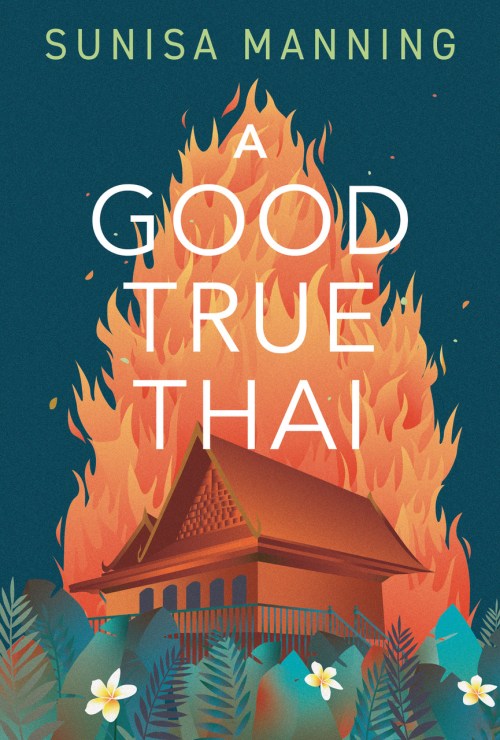[ad_1]
Censorship is something Thai American author Sunisa Manning is all too familiar with. Her thrilling and heartfelt debut novel A Good True Thai follows three young people whose paths converge at university leading up to the 1970s pro-democracy student movement in Thailand, their lives upended after a massacre of student demonstrators—a historical event that is taboo to discuss or write about in Thailand to this day. The country’s strict lèse-majesté law bans criticism of the Thai monarchy and penalizes perceived insults with up to 15 years in prison.
Since the publication of A Good True Thai, its subject matter has proven especially relevant. A finalist for the 2020 Epigram Books Fiction Prize, Manning’s novel was published on the heels of pro-democracy student demonstrations against the Thai monarchy and military establishment. Earlier this year, protesters took to the streets again after the progressive Thai party that won the country’s May election was blocked from taking office and forming a government. Conservative military-appointed lawmakers strongly opposed the party’s proposed reform of Thailand’s lèse-majesté law. Hundreds of people have been prosecuted with lèse-majesté charges since 2020, including young student activists and Thai lawmakers.
Manning returned to Thailand for the Bangkok Literature Festival last month, where she discussed A Good True Thai in the Kingdom for the first time and participated in a panel discussion on class with Emma Larkin, Shrayana Bhattacharya and Gwen Robinson. While none of the public conversations during the festival were overtly political in nature, Manning noted the personal connections she made with readers of A Good True Thai were meaningful, especially in light of the changing political landscape in Thailand.
“In Thai, political awakening is tah sawang, which means ‘to open your eyes,’” Manning said. “My book is about a 1970s moment of political awakening. Because of that frame, I got to talk to people who would share instances of tah sawang on their part. That’s a privilege to hear.”
This conversation took place both before and after her trip, and has been edited for length and clarity.
Elizabeth Niarchos Neukirch
What was it like to write a book that dances on the edge of strict censorship laws? How did you approach researching this time period, given the lack of access to, or omission of, certain historical records in Thailand?
Sunisa Manning
I initially wanted to write a contemporary novel about the lack of class mobility in my home country, but realized it would be too dangerous. Criticizing the monarchy is illegal. What I wrote about is a taboo subject, when students in the 1970s demonstrated against the military and overthrew a dictator. It’s up for debate whether the students criticized the monarchy, too. Bringing that question up in the novel, which I do, is politically sensitive.
I was writing the novel from Berkeley, California; UC Berkeley has an amazing Southeast Asian library, and there’s freedom of the press in the States. This meant I could access documents that were banned back home. Even so, some of the manuscripts that I read were not published officially because the writers would have gotten into too much trouble. When I got to them, there were explosions in my mind. I think I spent a lot of time crying in the Southeast Asian library. It was like leaving a religion. When you read documents and see photos and videos, you can’t unsee them. It took me years to process the truth and make some semblance of peace with what I’d learned. Then I got to work with the material.
When I was writing, the events of the ‘70s were still censored in Thailand. So I knew that I could kind of break the news of our own history to Thai people who can read in English. And I wanted to do that. The impulse towards truth and freedom is not just an American impulse.
The book took about eight years to write. There was a whole arc to my thinking around censorship. I was pretty stressed out about it, as a Thai citizen, and as someone who goes home regularly and has family there. The material of the book definitely made my family nervous. We had many conversations about it. I ultimately published under my married name to put some distance between my maiden name and the novel.
I’d talked with other Thai writers, and we would acknowledge how difficult it was to tell a story about our country without getting into political trouble. On the other hand, I am a dual citizen of Thailand and the United States. I came to believe that I occupied a unique position. If someone with the privilege of an American citizenship couldn’t write directly, who could?
Elizabeth Niarchos Neukirch
Your novel about the 1970s went into a second printing during the student protests in Thailand in 2021. Certainly you couldn’t have anticipated this political action would happen at the exact time your book debuted, but it wound up being very timely given its related subject matter. How did the novel’s initial reception compare to your expectations and what was that like for you?
Sunisa Manning
It was pretty spectacular. My book didn’t sell in the West, and I thought, okay, it’s just what these activists I interviewed told me, no one cares about the story of a Thai student uprising in the ‘70s. Why did I even revive it? I felt like I had misled some of the people that I got to interview. I was tramping around the jungle with these people who had fought on one side or the other. I thought, oh my gosh, I promised them that their stories would get heard, and I was wrong. And then when my book was published out of Epigram Books in Singapore, and people started reading it, it was heartening, and not just for me. There’s something beautiful that happens when the novel is about more than you and your ego.
Elizabeth Niarchos Neukirch
You are returning to Thailand for the Bangkok Literature Festival, which hasn’t happened in a few years. I’m curious if and how the current political climate, and the laws that are still in effect, have influenced your decision to go back for this book festival?
Sunisa Manning
Well, I’m really excited to go back home for the festival because I haven’t gotten to speak about my novel in Thailand yet. We did a book launch in Bangkok in 2020, but I was on Zoom. It’ll be challenging for me to be extra careful about what I say. There are ways in which I’ll get to talk about the novel that aren’t setting a house on fire—which is the cover of my book. I think I can talk as a writer and not as an activist.
When the news broke [of the latest political protests], Thailand was on the front page of The New York Times. It’s an interesting moment in the country. The Internet makes the suppression of information pretty untenable. You can’t take knowledge away.
Elizabeth Niarchos Neukirch
As a Thai and American citizen, and given your experience, what are your thoughts on censorship in America in this moment? We’re seeing unprecedented numbers of book bans in libraries and schools, limiting what information people can access. What do you think when you see this happening here?
Sunisa Manning
I think people have to get involved, and not in the way of wearing a pin in a blue state. I mean political power. Maybe losing democracy is like the loss of health: it happens slowly, and then all at once. I feel strongly about this as someone who has two citizenships. When I meet someone who doesn’t vote in the US, as someone from a country where we rarely get the chance to vote, and when we do often our vote is not upheld, as we just saw in Thailand—I know firsthand that you can’t take your system of government for granted.
I’m such a booster for America. This can be rare for someone who identifies as liberal. What we have here is a magical thing. It is not true that in every place you are born, you get a representative government.

FICTION
A Good True Thai
by Sunisa Manning
Epigram Books
Published October 17, 2020
[ad_2]
Source link

